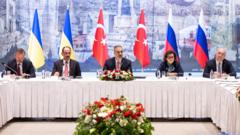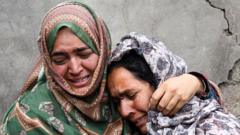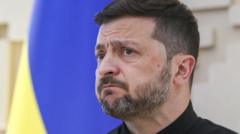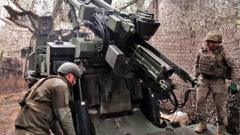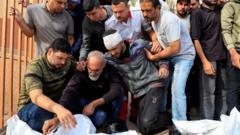In interviews, Russian soldiers have voiced a strong desire for territorial conquest in Ukraine, rejecting proposed ceasefires, which highlights the challenges facing President Putin in his ongoing negotiations.
Russian Soldiers Divided on Ceasefire in Ukraine Conflict

Russian Soldiers Divided on Ceasefire in Ukraine Conflict
Russian military morale shows a longing for territory over immediate peace, as soldiers express reluctance to halt fighting.
Many Russian soldiers are expressing doubts about the prospects for peace in Ukraine, insisting that any ceasefire must accompany the conquest of all claimed territories. As they grow weary of conflict, the prevailing sentiment among these troops suggests that territorial gains are essential to justify their sacrifices, showcasing the complexities within Russia as diplomatic talks progress.
The frustrations of eleven soldiers, who either currently serve or have served in the military campaign in Ukraine, are revealing. They criticized peace proposals as inadequate, stating that a ceasefire would represent a failure unless it includes the complete seizure of regions the Kremlin claims but only partially controls.
Sergei, in the Donetsk region, conveyed weariness, noting, "We’re all tired, we want to go home. But we want to take all of the regions, so that we don’t have to struggle for them in the future." This stark viewpoint reflects the expectations instilled in troops from the early stages of the conflict exacerbated by Russia’s swift annexation of territories.
This discourse is significant, revealing how the narrative shapes military morale and the domestic pressures on Putin to present a narrative of victory rather than retreat. In this sense, the debates around ceasefire negotiations represent a critical lens into both military and geopolitical dynamics at play.
As peace talks unfold, the implications of these soldiers’ desires highlight the potential for unrest in Russia if outcomes fall short of aspirations set forth during earlier phases of the invasion. Ultimately, the combination of exhausted soldiers hoping for territorial gains paired with Kremlin pressures complicates the current landscape of the conflict.
The frustrations of eleven soldiers, who either currently serve or have served in the military campaign in Ukraine, are revealing. They criticized peace proposals as inadequate, stating that a ceasefire would represent a failure unless it includes the complete seizure of regions the Kremlin claims but only partially controls.
Sergei, in the Donetsk region, conveyed weariness, noting, "We’re all tired, we want to go home. But we want to take all of the regions, so that we don’t have to struggle for them in the future." This stark viewpoint reflects the expectations instilled in troops from the early stages of the conflict exacerbated by Russia’s swift annexation of territories.
This discourse is significant, revealing how the narrative shapes military morale and the domestic pressures on Putin to present a narrative of victory rather than retreat. In this sense, the debates around ceasefire negotiations represent a critical lens into both military and geopolitical dynamics at play.
As peace talks unfold, the implications of these soldiers’ desires highlight the potential for unrest in Russia if outcomes fall short of aspirations set forth during earlier phases of the invasion. Ultimately, the combination of exhausted soldiers hoping for territorial gains paired with Kremlin pressures complicates the current landscape of the conflict.







